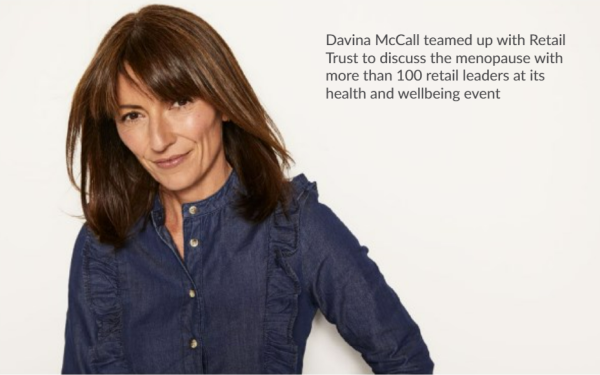Menopausal women are the fastest growing work demographic in the UK, so are we in the retail industry doing enough to support them?
There are more women than men in the UK. 72% of working age women, almost 16 million, are employed, and specifically, menopausal women are now the UK’s fastest-growing work demographic. But still, menopause remains a taboo subject. At home, in women’s personal lives, and, perhaps most importantly, at work.
Often well-meaning employers can regard it as such an intensely personal issue that it’s out of bounds to approach a worker who is suffering at work, as is often the case. 76% of women feel their symptoms cause problems in the workplace, according to The Menopause Survey 2018, which also found that that 20% of menopausal women have considered quitting their job as a result, rising to 44% of those experiencing the most severe symptoms.
A separate report, by the 2018 Scottish Trades Union Congress Women’s Committee, found that 32% of respondents felt the menopause was treated negatively at work while 63% said it was treated as a joke.
These feelings of shame and embarrassment that surrounds the menopause is wrong. The menopause and perimenopause (the period of up to ten years before menopause) is a completely natural biological process that happens to nearly all women. Yet far too many women - many of whom are at the peak of their careers and under other pressures – feel isolated, ashamed and struggling to cope because we’re shying away from speaking openly about its impact. As TV presenter Davina McCall has said:
We need to make it normal and unremarkable for people to discuss the menopause at work.

Davina has commendably put herself at the forefront of fighting this stigma following her Channel 4 documentary, Sex, Myths and The Menopause, speaking extensively about her own experiences and the need for us all to talk about the menopause more.
And at the Retail Trust we were thrilled to team up with Davina on this recently, by inviting her to discuss the menopause with more than 100 retail leaders at an event we hosted to address the health and wellbeing of the industry’s workforce.
Amidst much upheaval across the sector, we wanted retail employers to ask themselves whether they are really doing enough to support mental health, ensure inclusivity and build rewarding careers, and we wanted to make it clear that the menopause can no longer be ignored as part of this. It needs to be on the mental health agenda.
We should look at the menopause as any other health condition requiring help, understanding and often, medical treatment. Every woman needs and deserves her employer’s support with this, regardless of the severity of symptoms and how she’s being affected.
So, at the very least, it’s important that women who are struggling have time off for medical appointments or changes to a rota when symptoms are particularly severe. Desk fans or spare uniforms should also be considered for women who experience hot flushes, as well as allowing women to leave meetings without question if they need to, as a walk outside in the fresh air can help to reduce their intensity and the associated distress.
But perimenopause and menopause aren’t just about hot flushes. There are a myriad of normal symptoms, from insomnia and fatigue to anxiety, low mood, depression and suicidal thoughts. Every employer needs to understand this and treat any menopause-related performance issue the same as any other type of health-related performance problem, with reasonable adjustments to support women and encouragement for them to speak openly about what they need from their employer to stay present and engaged.
Women make up a large proportion of the British retail sector, so the industry already has a real responsibility to step up in this way. And it has been encouraging to see some retailers recently begin to promise better support, with Tesco pledging to introduce a more breathable fabric to its uniforms next year that will help women cope with hot flushes, and ASOS about to offer paid leave for a wider range of health-related issues, including the menopause.
Well-meaning employers regard it as out of bounds to approach a female worker when they think she may be suffering.
But this is not a woman-only issue and, as an industry that is as passionate as we are about our people, we have a duty to ensure that we do what we can to meet the needs of women who are affected, but to also create more open and supportive workplace cultures where it is perfectly unremarkable to speak about the menopause. This means every one of us understanding and talking about the menopause at work.
Because, after all, with so many colleagues working through extraordinary financial, physical and emotional pressures as a result of the pandemic, the future success of the industry now rests heavily on the hope, health and happiness of our workforce.
And creating workplace cultures where every employee feels listened to, supported and valued is not only the right thing to do but will also lead to better employee morale and engagement and a healthier workforce, with fewer sick days, higher staff retention rates and wider talent attraction.
Our purpose at the Retail Trust is to champion the cause of health in retail in this way, bringing the industry together around its people, and empowering every individual to take control of their wellbeing. And we want retailers who value their employees’ health and wellbeing to realise that an open and supportive culture around the menopause is a great way of showing this.
It’s time to stand up and be a menopause ally.
External links to reports, webpages and blogs
Supporting colleagues with the menopause
Davina McCall calls on retail employers to break menopause taboo
Retail Trust Leaders’ Summit (recordings will be available following the event)
To find out more about Retail Trust and the services they provide to the retail industry, click here.
This article was also published in The Retailer, our quarterly online magazine providing thought-leading insights from BRC experts and Associate Members.
